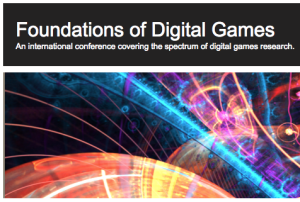Well, I’m going to be keynoting at the Foundation of Digital Games (FDG) Conference in just two weeks. That’s actually just one of the many things I’ll be doing. I’ll be serving on the doctoral colloquium as well as presenting as part of a panel with delightful people on a panel titled: “What Unity Wants/Making Things: Critical Approaches to Game Design Tools.” More on that soon.
Tagged with: FDG Keynote Presentation


Hi Casey!
I was at your panel on Unity and Game Design/Development today, and I meant to ask a follow-up question: How would you approach evaluating new or existing tools?
I come at this from a tool-making perspective for complex authoring systems. I understand that the target audience of the tool (skill level, design vs. development), purpose, and the domain can change evaluation approaches. There are user studies if a tool is ready (for novice users, usually, which takes a lot of polish to get decent responses) or tests for expessivity as Gillian Smith has done. I suppose you could also find some way to quantify the problem and prove the tool makes it quicker/easier/better to solve that problem than without it. What methods do you find most compelling?
Thanks,
~April